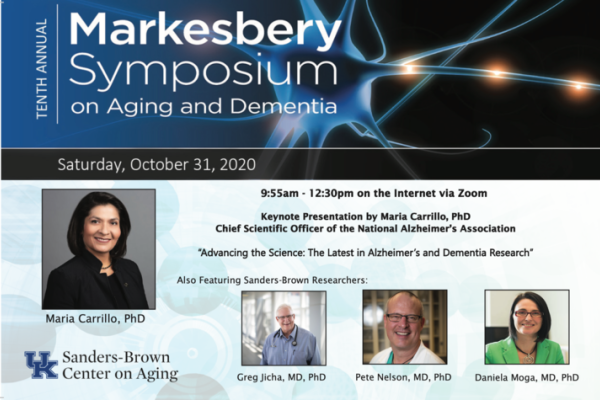Build Your Research Skills with the Medical Center Library’s Fall 2024 Research Workshop Series, Beginning Aug. 22

The Medical Center Library will begin its Fall 2024 Research Workshop Series on Aug. 22.
Held on Zoom, the virtual seminars help students, faculty, and staff improve and expand their research skills and make more efficient use of library resources. The workshops are primarily concerned with research competencies in the health sciences, but the subjects are pertinent to researchers across a variety of disciplines.
The Fall 2024 series will cover topics that range from data management and systematic reviews to open educational resources, artificial intelligence, and health disparities literature.
In late September and October, four workshops in the “Horrors of Bad Research” mini-series will address some of the frightening consequences of flawed research, along with strategies for keeping your work fear-free.
The workshops are free to attend and open to all UK students, faculty, staff, and affiliated researchers. Pre-registration is required to attend workshops. Attendees who have registered will be provided with a recording of the presentation.
Find more details and register for the workshops, and contact mclib@uky.edu with any questions.
Fall 2024 Series
The Fall 2024 workshops begin in late August and run to mid-November. Below, find a detailed description and registration link for each:
-
Introduction to the Medical Center Library
-
Thursday, August 22, 2024
-
12pm - 1pm
-
Get to know what services and research resources your library offers. Learn about time saving tools for accessing full text and setting up search alerts.
-
-
Searching for Health Disparities in the Literature
-
Wednesday, September 4, 2024
-
12pm - 1pm
-
Learn how to search for health disparities focused literature in PubMed. Become familiar with the Medical Center Library’s Searching Health Disparities Literature Research Guide.
-
-
So You Want to Do a Literature or Systematic Review?
-
Thursday, September 10, 2024
-
12pm - 1pm
-
Whether you have already been asked to complete a review, are brainstorming your own project, or simply want to build your research skills, this is your chance to learn about evidence syntheses from an expert. Join us and gain valuable knowledge to help you succeed in your research endeavors.
-
-
The Horrors of Bad Research, Part 1: Dodge Deception with Critical Appraisal
-
Wednesday, September 25, 2024
-
12pm - 1pm
-
Whether it’s a large-scale deception or the small-scale spinning of results, bad research is everywhere and it’s impacting clinical practice. This presentation will discuss the scope of the problem and inform participants of ways they can become more informed consumers of health sciences literature through critical appraisal.
-
-
The Horrors of Bad Research, Part 2: The Growing Systematic Review Monster
-
Wednesday, October 9, 2024
-
12pm - 1pm
-
Systematic reviews are an increasingly popular study that has long been considered a “gold standard” of evidence synthesis. However, a quick look at published reviews shows that many fall quite short of the gold standard moniker. Why are so many failing to meet the necessary high standards? And what should you know about standards and requirements before you take on an advanced review project?
-
-
The Horrors of Bad Research, Part 3: It’s Alive? Issues with Artificial Intelligence
-
Wednesday, October 16, 2024
-
12pm - 1pm
-
Artificial intelligence (AI) is an ever-growing presence in our lives, and it has its benefits. However, misunderstandings of AI’s limitations have led to it being misused in research. Learn about the proper and improper application of AI in health sciences research and how it’s impacting health sciences literature.
-
-
Data Disasters: How to Avoid Horror Stories in Data Management
-
Wednesday, October 23, 2024
-
12pm - 1pm
-
If not managed well, research data can go wrong in any number of ways, and the consequences range from minor inconveniences to retractions of published findings. Fortunately, you can protect yourself from data disasters large and small using good data management techniques. This presentation will cover some all-too-common data horror stories that researchers experience and how you can guard against them.
-
-
OER 101 for Health Sciences
-
Monday, November 11, 2024
-
12pm - 1pm
-
Open educational resources (OER) are free and open access alternatives to commercial course materials. In this session, we will cover the background of textbook costs in the US and their impact on students, then go over what OER are and how they work (both practically and in terms of copyright). We will then address how to find, adopt, and create OER for health sciences. The concluding discussion will include recommended resources and ways to get involved with open education communities, as well as an overview of support available at UK.
-
-
Roadmap to Successful Reviews: Translating Searches
-
Thursday, November 14, 2024
-
12pm - 1pm
-
Every database speaks a different “language”. By learning to translate search queries into multiple databases, we can expand the scope of our research and ensure that all relevant studies are included. Join our experts to learn how to translate and the tools available to assist you. Common mistakes and tool pitfalls will be discussed.
-
The Reviews Are In
Past workshop participants have universally applauded their experience. In surveys following the workshops, 100% of participants who filled out the survey indicated that they had learned something new.
“This was the clearest presentation of concrete steps for data management that I've ever seen,” commented one participant. Other commenters raved about the new techniques, tools, and resources they were able to add to their research repertoires.
Workshop contents met the expectations of 100% of participants who filled out the survey.
Experience them for yourself – and catch up on what you’ve missed in prior years. The MCL has past workshop recordings and associated slides available for public view. Topics include:
-
Introductory tutorials for tools, resources, and software used in health sciences research
-
In-depth guidance and advanced search training for popular databases
-
Extensive coverage of systematic reviews and other evidence synthesis projects
In the mood for more? Visit our Research Workshops & Tutorials page to find all of UK Libraries’ offerings, including our Digital Scholarship & Data Workshops & Events.
More from this series Press Conferences & Events
Credits
Words: Robby Hardesty (UK Libraries)



